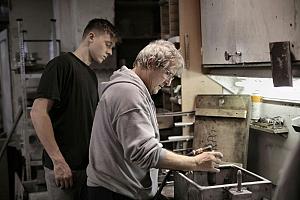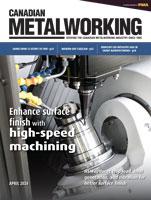Editor
- FMA
- The Fabricator
- FABTECH
- Canadian Metalworking
Manufacturers are becoming increasingly frustrated with border crossing troubles
Border restrictions will force visitors to look to competing jurisdictions
- By Joe Thompson
- March 26, 2021
- Article
- Made In Canada

Canadian manufacturers want safe, efficient travel across the border to maintain key business relationships. Getty
It’s getting increasingly difficult for some Canadian manufacturers to travel across our border with the U.S. Vague, misconstrued, and ignored government edicts are making border crossings difficult, and sometimes even impossible, for Canadian workers crossing south and American workers coming north.
The Canada/U.S. border has a long, contentious history of treaties, conventions, and wars that all have done their part to shape this 8,891-km boundary. The beginnings of the formal border started with the Treaty of Paris (1793), and the 49th parallel was established at the London Convention (1818). Its current location wasn’t agreed upon until 1908.
Now, more than one year after COVID-19 closed the border to non-essential travel, there still exists confusion at the border on what constitutes essential workers.
Wrong Way
“The border issues continue to move in the wrong direction, and the actions at the border, in my opinion, violate the essential workers legislation set out by the Ontario government,” said Don Rodzik Jr., director of operations and general counsel of The Narmco Group, Windsor, Ont.
In 2020 manufacturing, and the companies supplying manufacturing, was deemed essential to the Canadian economy and was exempted from the travel ban at land crossings to the U.S.
Rodzik is among many manufacturers who feel that restrictions placed on essential-business visitors entering Canada will force these visitors to look to competing jurisdictions.
Automotive suppliers are deemed to be critical infrastructure workers, essential for shared economy of the U.S. and Canada. Rodzik said he thinks that these workers are being stopped at the border for no reason.
“The government/border agency needs to recognize the [problem] and act upon proof (such as a purchase order) that will allow key managers, technicians, engineers, and owners to move freely across the border without quarantine. Proof of COVID-19 practices and rapid testing also can be used,” said Rodzik.
While manufacturers ship capital goods and technologies to the U.S., they must also send skilled personnel to American customers for sales and design work, as well as hands-on technical support.
Denial of Entry
Denial of entry and inconsistent application of entry and quarantine rules at the border are costing these industries millions of dollars in lost revenue and will jeopardize jobs and economic growth in Canada in the long term.
“Both the federal and provincial governments have provided written definitions of ‘essential workers,’ but these are being totally ignored now by CBSA [Canada Border Services Agency] officials, and people are now being deemed essential by how often they cross the border. This makes no sense to us,” said Robert Cattle, executive director of the Canadian Tooling & Machining Association (CTMA).
“It makes no sense that an individual with a L1 or TN visa that hasn’t crossed to the U.S. out of respect of the border restrictions, but who now has to cross because of essential work, must quarantine and provide PCR test for a one-day trip or even a one-hour trip to Detroit from Windsor,” said Rodzik.
The Canadian Association of Mold Makers (CAMM) represents manufacturing businesses across the country that rely on a substantial customer base in the U.S. It is asking that the CBSA and the Public Health Agency of Canada (PHAC) work with it to develop guidelines and tools to help reduce the risk of spreading COVID-19 and allow essential workers to be able to cross the border freely and easily.
CAMM wants written guidance on common entry scenarios, pre-clearance of low-risk business travellers, certification of workplaces for compliance to public health guidelines, rapid testing, and rapid testing with a certification process that will allow for the flow of workers, but still maintain safety protocols.
In a recent survey involving CTMA, CAMM, Automate Canada, and the Niagara Industrial Association (NIA), more than half of respondents agreed that problems moving personnel and clients have negatively affected their ability to attract new customers, retain existing customers, fulfill contractual obligations, support cash flow, and improve profitability.
“The border crossing and the free movement of goods impact us tremendously, and now that there is an impediment, it’s even worse,” said Jonathon Azzopardi, CAMM chair and president of Laval Tool. “There was a blunder made by the federal government that you could move goods across the border without moving people across the border. It literally is a critical failure. We’ve basically created our own trade barrier.”
Azzopardi doesn’t want the border opened, he just wants a process in place to be able to move key, essential workers across the border safely. However, the border confusion is causing both short- and long-term problems and needs fixed.
“Even after they’ve figured out the border issues, all those contracts, all of those relationships, they’re all gone,” said Azzopardi. “We need a process that’s going to manage this situation now and in the long run. The export of goods goes hand-in-hand with the mobility of people. We need a process that satisfies PHAC, foreign trade, and economic development.”
Petition Made
On March 19 the Windsor Essex Border Task Force, represented by CAMM, CTMA, and Automate Canada, presented a petition to Essex member of parliament Chris Lewis to allow the free movement of essential manufacturing workers across the Canada-U.S. border.
Currently, employment obligation makes it allowable to enter Canada without observing a 14-day isolation, while employees under contractual obligation are not.
The group is asking that contractual obligation be treated the same as employment obligation when it comes to travellers entering Canada.
About the Author

Joe Thompson
416-1154 Warden Avenue
Toronto, M1R 0A1 Canada
905-315-8226
Joe Thompson has been covering the Canadian manufacturing sector for more than two decades. He is responsible for the day-to-day editorial direction of the magazine, providing a uniquely Canadian look at the world of metal manufacturing.
An award-winning writer and graduate of the Sheridan College journalism program, he has published articles worldwide in a variety of industries, including manufacturing, pharmaceutical, medical, infrastructure, and entertainment.
Related Companies
subscribe now


Keep up to date with the latest news, events, and technology for all things metal from our pair of monthly magazines written specifically for Canadian manufacturers!
Start Your Free Subscription- Industry Events
MME Winnipeg
- April 30, 2024
- Winnipeg, ON Canada
CTMA Economic Uncertainty: Helping You Navigate Windsor Seminar
- April 30, 2024
- Windsor, ON Canada
CTMA Economic Uncertainty: Helping You Navigate Kitchener Seminar
- May 2, 2024
- Kitchener, ON Canada
Automate 2024
- May 6 - 9, 2024
- Chicago, IL
ANCA Open House
- May 7 - 8, 2024
- Wixom, MI




















